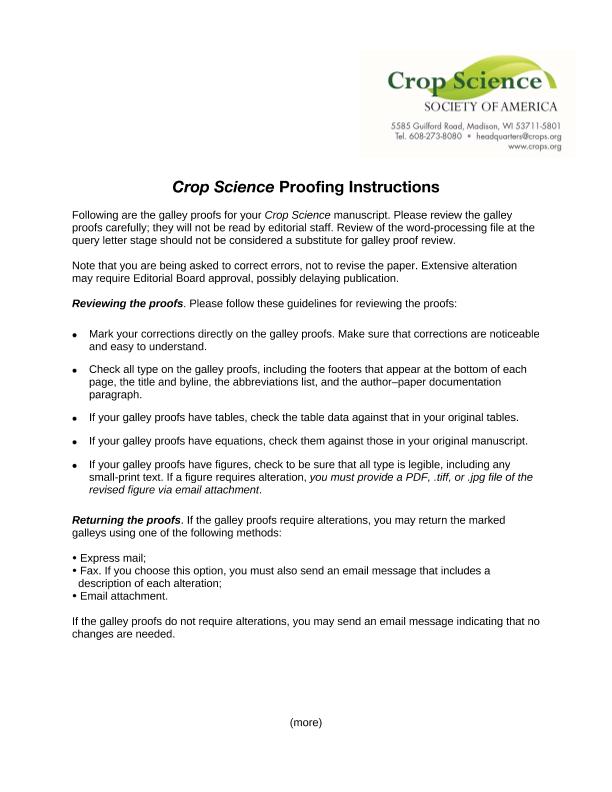Mostrar el registro sencillo del ítem
dc.contributor.author
Seijo, José Guillermo

dc.contributor.author
Kovalsky, Ivana Evelìn

dc.contributor.author
Chalup, Laura María Isabel

dc.contributor.author
Samoluk, Sergio Sebastián

dc.contributor.author
Fávero, Alessandra
dc.contributor.author
Robledo Dobladez, Germán Ariel

dc.date.available
2019-09-02T17:40:01Z
dc.date.issued
2018-07
dc.identifier.citation
Seijo, José Guillermo; Kovalsky, Ivana Evelìn; Chalup, Laura María Isabel; Samoluk, Sergio Sebastián; Fávero, Alessandra; et al.; Karyotype stability and genome-specific nucleolar dominance in peanut, its wild 4× ancestor, and a synthetic AABB polyploid; Crop Science Society of America; Crop Science; 58; 4; 7-2018; 1671-1683
dc.identifier.issn
0011-183X
dc.identifier.uri
http://hdl.handle.net/11336/82721
dc.description.abstract
Allopolyploidy is a significant evolutionary process involved in the origin of many crops, including peanut (Arachis hypogaea L.). The process usually results in a series of chromosome, genomic and epigenetic rearrangements in the derived polyploids. Here, we examined the chromosomal consequences undergone by AABB tetraploids of Arachis after the genome merger. For that objective, different chromosome markers and DNA contents were compared among peanut, its wild tetraploid ancestor, and the diploid genome donors A. duranensis Krapov. & W.C. Gregory (AA, female) and A. ipaënsis Krapov. & W.C. Gregory (BB, male). The analysis also included an artificially synthesized allotetraploid using A. ipaënsis as a female [(A. ipaënsis × A. duranensis)4×]. The karyotypes in the natural (originated ~10,000 yr ago) and newly synthesized allopolyploids have largely maintained the patterns of heterochromatin and ribosomal RNA loci detected in the diploid progenitors. Intergenomic translocations were not evident using genome in situ hybridization, and the DNA contents of the allotetraploids corresponded to the expected sum of those observed in their parental species. The analysis of ribosomal DNA loci and their association with nucleolar organizing regions revealed a rapid establishment of nucleolar dominance in favor of the A genome. The large macrostructural stability of karyotype observed here after polyploidization has not been frequently cited for polyploid crop plants. This stability is significant for peanut breeding, since it suggests that effective introgression of wild useful alleles into cultivated peanut may potentially occur in most of the extension of the A and B chromosome complements.
dc.format
application/pdf
dc.language.iso
eng
dc.publisher
Crop Science Society of America

dc.rights
info:eu-repo/semantics/openAccess
dc.rights.uri
https://creativecommons.org/licenses/by-nc-sa/2.5/ar/
dc.subject
Poliploides
dc.subject
Estabilidad Cariotipica
dc.subject
Maní
dc.subject
Anfidiploide
dc.subject.classification
Genética y Herencia

dc.subject.classification
Ciencias Biológicas

dc.subject.classification
CIENCIAS NATURALES Y EXACTAS

dc.title
Karyotype stability and genome-specific nucleolar dominance in peanut, its wild 4× ancestor, and a synthetic AABB polyploid
dc.type
info:eu-repo/semantics/article
dc.type
info:ar-repo/semantics/artículo
dc.type
info:eu-repo/semantics/publishedVersion
dc.date.updated
2019-08-01T20:25:56Z
dc.identifier.eissn
1435-0653
dc.journal.volume
58
dc.journal.number
4
dc.journal.pagination
1671-1683
dc.journal.pais
Estados Unidos

dc.journal.ciudad
Baltimore
dc.description.fil
Fil: Seijo, José Guillermo. Consejo Nacional de Investigaciones Científicas y Técnicas. Centro Científico Tecnológico Conicet - Nordeste. Instituto de Botánica del Nordeste. Universidad Nacional del Nordeste. Facultad de Ciencias Agrarias. Instituto de Botánica del Nordeste; Argentina
dc.description.fil
Fil: Kovalsky, Ivana Evelìn. Consejo Nacional de Investigaciones Científicas y Técnicas. Centro Científico Tecnológico Conicet - Nordeste. Instituto de Botánica del Nordeste. Universidad Nacional del Nordeste. Facultad de Ciencias Agrarias. Instituto de Botánica del Nordeste; Argentina
dc.description.fil
Fil: Chalup, Laura María Isabel. Consejo Nacional de Investigaciones Científicas y Técnicas. Centro Científico Tecnológico Conicet - Nordeste. Instituto de Botánica del Nordeste. Universidad Nacional del Nordeste. Facultad de Ciencias Agrarias. Instituto de Botánica del Nordeste; Argentina
dc.description.fil
Fil: Samoluk, Sergio Sebastián. Consejo Nacional de Investigaciones Científicas y Técnicas. Centro Científico Tecnológico Conicet - Nordeste. Instituto de Botánica del Nordeste. Universidad Nacional del Nordeste. Facultad de Ciencias Agrarias. Instituto de Botánica del Nordeste; Argentina
dc.description.fil
Fil: Fávero, Alessandra. Ministerio da Agricultura Pecuaria e Abastecimento de Brasil. Empresa Brasileira de Pesquisa Agropecuaria; Brasil
dc.description.fil
Fil: Robledo Dobladez, Germán Ariel. Consejo Nacional de Investigaciones Científicas y Técnicas. Centro Científico Tecnológico Conicet - Nordeste. Instituto de Botánica del Nordeste. Universidad Nacional del Nordeste. Facultad de Ciencias Agrarias. Instituto de Botánica del Nordeste; Argentina
dc.journal.title
Crop Science

dc.relation.alternativeid
info:eu-repo/semantics/altIdentifier/doi/http://dx.doi.org/10.2135/cropsci2018.02.0088
dc.relation.alternativeid
info:eu-repo/semantics/altIdentifier/url/https://dl.sciencesocieties.org/publications/cs/abstracts/58/4/1671
Archivos asociados
